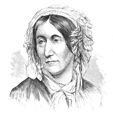Wikipedia:University of Edinburgh/Events and Workshops/Ada Lovelace Day 2023
Ada Lovelace Day 2023: Celebrating Women in STEM in a nutshell:
|
Short link for today's event page
[edit]- Type Tinyurl.com/ada-ed2023 in your browser.
Booking
[edit]- How do I sign up?: Register via MyEd.
-
Carpenter portrait of Ada Lovelace – detail
-
Ada Lovelace Day logo
-
Interview Emily Temple-Wood discussing gender diversity on Wikipedia and WikiProject Women Scientists
-
Ada Lovelace Day 2016 at the University of Edinburgh Main Library 01
-
Ada Lovelace portrait
Info about the event
[edit]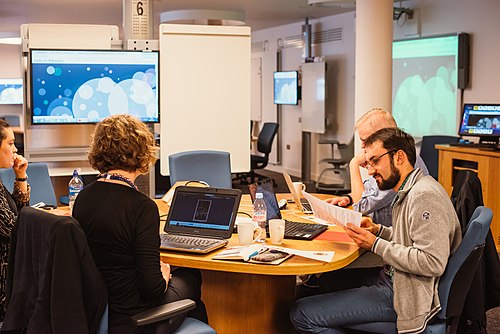
Did you know that most volunteer Wikipedia editors are male, and that there are fewer and less extensive articles on Wikipedia about women and issues important to women? There are thousands of female scientists, engineers, mathematicians and technologists who meet Wikipedia's standards for notability but don't yet have a page.
Come and help us add more notable women in STEM to Wikipedia at our Ada Lovelace Day editathon!
Your 1, 2, 3 to get started!
[edit]- Create your Wikipedia account
- Once you have created your account join the Wiki dashboard
- Make sure you have a cup of tea or coffee to keep yourself fuelled!
Schedule
[edit]- 1:50–2:00 pm: Everyone creates account and logs-in to Wikipedia.
- 2:00–2:05 pm: Welcome from Ewan McAndrew and discussion of Wikipedia pages we can look to create during the event.
- 2:05–3:00 pm: Wikipedia training from Ewan McAndrew.
- 3:00–4:30 pm Research and Editing with aim to publish by 5pm
- 4:30–4:50 pm: Publish articles with help from Ewan McAndrew
- 4:50–5:00 pm Event close
Join us as we help make Wikipedia better!
Join us at our next monthly Wiki Women in Red meetup (last Friday of the month)
Undertake 55–80 hours of Digital Volunteering with Wikipedia on the Edinburgh Award (18 October – 31 March)

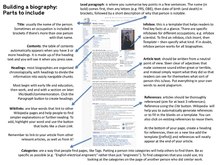
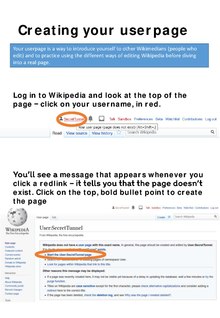
Getting started with editing
- Exploring the main page of Wikipedia (4 mins)
- How to create an account on Wikipedia (1 min 30 secs)
- How to switch on the (easier to use) Visual Editor interface (1 min 20secs)
- How to create a user page and play around with formatting (4 mins)
- How to create an article on Wikipedia (7 mins)
- How to move your drafted article to the main article space on Wikipedia (2 mins)
- How to add bold, headings, links, italics to a Wikipedia page (3 mins)
- How to add citations and references to a Wikipedia page (3 mins)
- How to upload an image to Wikimedia Commons (Wikipedia's sister project) – 4 mins
- How to insert an image from Wikimedia Commons onto a Wikipedia page (3 mins)
- How to edit existing pages on Wikipedia (4 mins)
- Some printable resources are here.
These are all embedded in our student-created Wikimedian in Residence website here to make the how & why of editing Wikipedia much easier to engage with. Undergraduate student Hannah Rothmann's work creating this website and the video resources above in lockdown Summer 2020 won an Open Education Global award recently. Because we felt that students, educators and everyone should be able to do this much more simply and have this 'need to know' information readily and openly available so I hope this is of use to you.
Worklist
[edit]- Looking for ideas? Imperial physicist Jess Wade has written over 2,000 Women in STEM onto Wikipedia!
Royal Society of Edinburgh Female Fellows for 2023
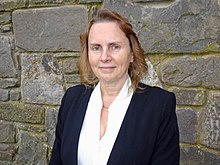

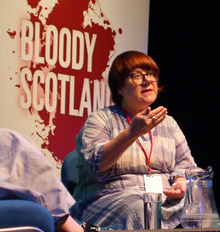
- Professor Lis Neubeck, cardiac nurse and Head of Cardiovascular Health in the School of Health and Social Care at Edinburgh Napier University.[1]
- Professor Claire Connolly – Professor of Modern English, University College Cork. Claire Connolly is Professor of Modern English at University College Cork. She has research interests in Irish and Scottish romanticism and is the Co General Editor of Irish Literature in Transition.[2]
- Professor Liz Bacon – Principal and Vice-Chancellor, Abertay University. Liz is a Professor of Computer Science, with a PhD in Artificial Intelligence. Her research focuses primarily on technology-enhanced, and immersive, learning.[3]
- Professor Alex Lascarides – Professor of Semantics, University Of Edinburgh. Prof. Alex Lascarides' research is in theoretical and computational linguistics and AI.[4]
- Gillian Berkeley – Education Professional, No organisation. Gill is an enthusiastic and dedicated tertiary education professional, with a record of achievement in educational leadership at further and higher education level. She is experienced at bringing together academics and stakeholders to produce curriculum where the learner experience is paramount. She is committed to enhancing the value of education, communication of knowledge and effective pedagogy. She is a Fellow of the Royal Society of Chemistry (RSC) and in 2019 was presented with the RSC Award for Service in recognition of outstanding service to the RSC and the chemical education community in Scotland. Gill was the Chair of the RSC Education Division (Scotland).[5]
- Professor Clare Bond – Professor, Geosciences, University of Aberdeen. Professor Clare Bond is an Earth Scientist interested in global interactions of Earth processes and people. My research activities aim to achieve impact on and accelerate our energy transition to net zero.[6]
- Professor Jan Clarkson – Professor of Clinical Effectiveness, University of Dundee. Jan is Professor of Clinical Effectiveness, Honorary Consultant in Paediatric Dentistry, University of Dundee, Professor of Clinical Dental Research at University of Manchester and Associate Postgraduate Dental Dean, NHS Education for Scotland. She is an internationally acknowledged leader in Oral Health for the generation, synthesis and implementation of evidence to prevent and treat oral disease world-wide.[7]
- Liz Connolly – Principal and Chief Executive, West College Scotland. Elizabeth (Liz) Connolly has over 20 years senior leadership experience within economic development at the education sector. Her interests lie in widening participation, developing appropriate pathways for all learners and the key role of skills in developing and growing the Scottish economy.[8]
- Sharon Cowan – Professor of Feminist and Queer Legal Studies, University Of Edinburgh. Professor Sharon Cowan completed an LLB (Hons) from Strathclyde University, and an MPhil in Criminology from the University of Cambridge. She was a researcher at the London School of Economics before going on to complete a PhD at Brunel University, London. After three years as a lecturer at the University of Warwick Sharon joined the University of Edinburgh in 2004. She is a co-convenor of the Scottish Feminist Judgments Project: https://www.sfjp.law.ed.ac.uk/. Her work has made a long-standing contribution to research and teaching on sex, gender and sexuality in the fields of criminal law, asylum law and equality law.[9]
- Alison Culpan – Scotland Director, Association of the British Pharmaceutical Industry. Alison has played a leading role within the Scottish life sciences sector, in particular the pharmaceutical sector, for over 20 years.[10]
- Albena Dinkova-Kostova – Professor of Chemical Biology, University of Dundee. Albena Dinkova-Kostova is an internationally recognised scientist with expertise in cellular responses to stress and the links between oxidative stress, inflammation and metabolism. Working at the interface between Chemical Biology and Medicine, her research examines the mechanisms of regulation of cytoprotective adaptive responses regulated by transcription factor Nrf2, with the ultimate goal of implementing the knowledge from basic science discoveries for prevention and treatment of chronic diseases.[11]
- Cathy Gallagher – Executive Director of Sport, University of Stirling. Cathy has over 20 years' experience in the university sport sector and currently has responsibility for the strategic development of sport at Scotland's University for Sporting Excellence, comprising a unique combination of student club sport, recreational opportunities and a world-class training environment for performance sport athletes.[12]
- Maria Fusco – Professor of Interdisciplinary Writing, University of Dundee. Maria Fusco is a working-class interdisciplinary writer. Born in Belfast, she lives and works in Scotland. Her award-winning work is published and performed internationally and has been commissioned by organisations including: Artangel; BBC Radio 4; Film London; National Theatre Wales; Pompidou Centre, Paris and the Royal Opera House. [13]
- Professor Karen Halliday – Chair of Systems Physiology and Dean of Systematic Inclusion, University Of Edinburgh. Karen Halliday is Chair of Systems Physiology at the University of Edinburgh. She studies systems approaches to biological problems and conducts cross-disciplinary research spanning molecular-genetics, mathematics, computational science, the humanities and social sciences. She has directed large, multifaceted cross-disciplinary projects, published widely in her primary research area of plant photobiology, and with social scientists on STEMM diversity and inclusion.[14]
- Professor Dee Heddon – James Arnott Chair in Drama, University of Glasgow. Awarded a PhD from the University of Glasgow in 1999, she began her Higher Education career at the University of Exeter, returning to Glasgow in 2005. In 2015, she was appointed James Arnott Chair in Drama. Her research engages with contemporary performance, including autobiographical, experimental, and environmental. She has an enduring interest in walking aesthetics and her current funded research explores walking experiences during COVID-19 and the use of creative activities to support these. She is also a Co-Investigator on a large NERC project, 'Treescapes', investigating uncertainty and adaptation in trees and forests.[15]
- Professor Sascha Hooker – Professor of Marine Ecology, University of St Andrews. Professor Sascha Hooker is a marine scientist with wide interests in wildlife ecology, conservation, and environmental sustainability. Using technological tools such as animal-attached tags or analyses of tissue isotope signatures, she studies how and where animals feed, the physiology underpinning this, and implications for marine conservation decision-making. [16]
- Professor Ima Jackson – Professor of Community Engagement in Research, Social Policy and Infrastructure Development, Glasgow Caledonian University. Her work involves research, knowledge exchange, social policy and infrastructure development which all builds from community engagement with those adversely racialised and marginalised in our society. Community engagement is the core -it is not an extra.[17]
- Mrs Sarah Jardine – Chief Executive Officer, epipole. Sarah is COO of retinal imaging company epipole. A graduate of both Strathclyde and Heriot-Watt Universities she has a BSc (Hons) in Laser Physics and an MSc in Laser Engineering. Starting her career as a Laser Engineer at Thales Optronics, Sarah is experienced in product development, conversion to early-stage manufacturing and transition to large scale production, due to 20 years in various roles at industry-leading retinal imaging specialist Optos. [18]
- Ms Uzma Khan – University of Glasgow. Uzma Khan is Vice-Principal for Economic Development and Innovation, and Deputy Chief Operating Officer at the University of Glasgow, which she joined in 2020. She has responsibility for taking forward the University's Innovation and Economic Development strategy, focused on delivering positive impact on the city and beyond.[19]
- Regius Professor Alison Lumsden – Regius Chair in English Literature, University of Aberdeen. Alison Lumsden is Regius Chair in English Literature at the University of Aberdeen. She has published extensively on Scottish literature and is Director of the Walter Scott Research Centre. She was a General Editor of the Edinburgh Edition of the Waverley Novels and is now leading work on an AHRC project The Edinburgh Edition of Walter Scott's Poetry: Engaging New Audiences. [20]
- Dr Fiona McNeill – Reader in Computer Science Education, University Of Edinburgh. Dr Fiona McNeill gained her PhD from the University of Edinburgh in 2006, focussing on dynamic data integration and ontology matching. Throughout her career, she has spent significant time on issues around CS and STEM Education, in particular access to education and inequalities within that. [21]
- Professor Isla Myers-Smith – Professor of Climate Change Ecology, University Of Edinburgh. Prof. Isla Myers-Smith is a Chancellor's Fellow at the University of Edinburgh and a global change ecologist. She studies plants in the Arctic and beyond and how ecosystems are responding to climate change.[22]
- Dr Margaret McCartney – Chief Scientist Office NHS Research Fellow and Hon Senior Lecturer, University of St Andrews. Margaret McCartney is a practicing GP, Honorary Senior Lecturer at the University of St Andrews, and Senior Associate at the Centre for Evidence Based Medicine, University of Oxford. She is an experienced, prize winning writer, author and broadcaster, and has been PPA columnist of the year. Her research interests include policy making, risk communication, screening, conflicts of interest, bias, and evidence communication.[23]
- Professor Jacqui Matthews – Director of Veterinary Science, Austin Davis Biologics. Jacqui is a veterinary parasitologist. Her research focusses on using science to find solutions to control helminths in horses and livestock sustainably. [24]
- Ms Karyn McCluskey – Chief Executive, Community Justice Scotland. Karyn trained as a nurse, and then in psychology. She spent 21 years with the police and helped establish the Violence Reduction Unit in 2003 with a Public Health approach to preventing violence, which is replicated in the UK and internationally.[25]
- Ms Karina McTeague – Non-Executive Director, Department for Business and Trade. Karina McTeague is a business leader and risk professional experienced in UK and international banking, financial services regulation, governance and global payments. [26]
- Professor Lorna Milne – Professor of French and former Master and Deputy Principal, University of St Andrews. Lorna Milne is a Professor of French at the University of St Andrews where she has had a career spanning 17 years in senior management, taking in the roles of Dean of Arts, Vice-Principal for Education, Master of the United College and Deputy Principal. [27]
- Professor Elisa Morgera – Professor of Global Environmental Law, University of Strathclyde. Elisa Morgera is Professor of Global Environmental Law at the University of Strathclyde Law School and specializes in international biodiversity law and its linkages with human rights, notably the human rights of small-scale fishers, Indigenous Peoples, women and children.[28]
- Professor Rachel Norman – Chair of Food Security and Sustainability, Institutional Dean for Research Engagement and Performance, University of Stirling.She graduated with a first class honours degree in Mathematics from Liverpool University in 1991. She then went on to do a PhD in Mathematical Ecology funded by a Wellcome Trust prize studentship. She spent a year in Oxford Zoology department modelling the dynamics and control of Lymphatic filariasis.[29]
- Mrs Angela Scott TC BioPharm Scotland. Born and raised in Edinburgh, Angela Scott has a life-long passion for biological-sciences. After graduating, her career commenced at the Imperial Cancer Research Fund, Edinburgh. Moving to industry Angela became fascinated by the therapeutic potential of stem cells, working in Singapore and Scotland as part of the ground-breaking team that cloned Dolly the Sheep.[30]
- Professor Catherine Steel – Professor of Classics, University of Glasgow. She is a historian of ancient Rome, with a specific focus on the political culture of the Roman Republic and on the role of public speech within it. She has worked extensively on the orator and politician Cicero, and on the development of oratory at Rome as a genre of writing as well as a method of political communication. [31]
- Professor Alyson Tobin – Former Vice Principal for Learning and Teaching, Edinburgh Napier University. Alyson is a former Vice Principal for Learning and Teaching, and Emeritus Professor in Biology at Edinburgh Napier University. She is an experienced advisor in higher education, formerly Chair of the Scottish Higher Education Enhancement Committee and a current member of the SQA National Qualifications Strategy Group. Alyson is a non-executive Director and chair of the Science Excellence and Research Impact Committee at the James Hutton Institute. She is a plant scientists, honorary Professor of Biology and former Dean of Science at the University of St Andrews, a Fellow of the Royal Society of Biology, and chair of judges for the STEM for Britain Biological Sciences awards at Westminster Parliament.[32]
- Professor Sarah Walmsley – Professor of Respiratory Medicine, University Of Edinburgh. Sarah Walmsley is a Professor of Respiratory Medicine at the University of Edinburgh. Sarah undertook her medical training at the University of Edinburgh graduating in 1997, and an MRC training fellowship at the University of Cambridge with award of PhD in 2004. She completed her specialist training in Respiratory Medicine in Sheffield, as a Wellcome Intermediate then Senior Clinical Fellow, with two periods of maternity leave, prior to returning to Edinburgh in 2014. Her work is focused on addressing one of the major challenges in respiratory medicine – to limit tissue damage caused by neutrophilic inflammation in inflammatory lung disease. [33]
- Mrs Jackie Waring – Founder, Investing Women Angels Ltd. Jackie Waring is a trail blazing influential entrepreneur with a track record of over 30 years impactful advocacy for women's entrepreneurship.[34]
- Professor Janette Webb – Professorial Fellow Social and Political Science, University Of Edinburgh. Janette Webb MBE is Professorial Fellow, Social and Political Science, University of Edinburgh. Her research focuses on societal responses to climate crisis, and the tight coupling between modern societies and fossil fuels across sectors and scales, from global finance to governments to low-income households. She is currently Co-Director of UK Energy Research Centre, leading multi-disciplinary research on the potential of integrated local and regional energy systems to improve 'whole system' resilience, affordability and efficiency.[35]
- Professor Louise Welsh – Professor of Creative Writing, University of Glasgow. Louise Welsh is the author of nine novels including The Cutting Room, The Plague Times Trilogy and The Second Cut. Louise has a ten-year practice in opera with composer Stuart MacRae. She was co- director (with Jude Barber) of the Empire Café an award-winning exploration of Scotland's relationship with the North Atlantic slave trade. [36]
- Ms Jackie Wylie – Chief Executive and Artistic Director, National Theatre of Scotland. Jackie Wylie is Artistic Director and Chief Executive of the National Theatre of Scotland, an ambitious and forward-thinking organisation. This 21st century 'Theatre Without Walls' makes, extraordinary, relevant theatre by, with and for contemporary Scotland, touring this work throughout Scotland and beyond.[37]
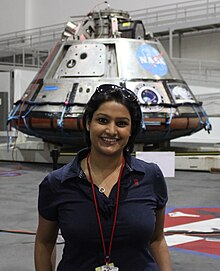

Target articles to create & improve for 2023
- Frauke Zeller – Professor of HCI & Creative Informatics at Edinburgh Napier, creator of the first hitchhiking robot. Edinburgh Napier bio – [38]
- Al-‘Ijliyah bint al-‘Ijli al-Asturlabi – Applied Science – astrolabes. [39]
- Dr Siti Khayriyyah Mohd Hanafiah – List of publications: [40]. Newspaper articles [41][42]. FameLab Talk: [43]
- Jo Leen Yap – Publication: [44]. BBC interview: [45]. Research poster: [46]
- Varsha Jain – 'Space gynaecologist', Centre for Reproductive Health, University of Edinburgh. Varsha Jain is a British physician known as a "space gynaecologist". She has studied at universities in the UK but with an interest in space medicine. She is a clinical doctor also researching women's health at the University of Edinburgh. Can this page be updated please? It has small inaccuracies apparently.
- Professor Angela Thomas OBE.[47] – Thomas is a consultant paediatric haematologist and former director of the haemophilia centre, Royal Infirmary of Edinburgh. Page needs updated. Angela has provided some sources of information.
Some sources for 2023
- The Unforgotten Sisters – Female Astronomers and Scientists before Caroline Herschel
- Celebrating 100 Years of Female Fellowship of the Geological Society: Discovering Forgotten Histories
- Chemistry was their life: pioneering British women chemists, 1880-1949
- The biographical dictionary of women in science : pioneering lives from ancient times to the mid-20th century / Marilyn Ogilvie and Joy Harvey, editors. Available at Main Library (REFERENCE) – 3rd floor ; Ref. Folio Q141 Bio.
Chemistry was their life
- Millicent Taylor – only one of the 19 women chemists who petitioned in 1904 for Fellowship of the Chemistry Society without a page. In Chemistry was their Life source above.
- Aberdeen Ladies' Educational Association – mentioned in Chemistry was their Life source above.- Is there enough out there for an article?
Women pharmacist pioneers
[edit]- Elizabeth Leech – 1st woman to apply to the Pharmaceutical Society in 1869. In Chemistry was their Life source above.
- Rose Coombes Minshull – In Chemistry was their Life source above. 1 of 3 students put forward for Pharmaceutical Society membership in 1873.
- Louisa Stammwitz – In Chemistry was their Life source above. 1 of 3 students put forward for Pharmaceutical Society membership in 1873.
- Alice Marion Rowland – In Chemistry was their Life source above. 1 of 3 students put forward for Pharmaceutical Society membership in 1873. Mentioned in Rose's article as Alice Hart (her married name).
- Isabella Skinner Clarke-Keer – In Chemistry was their Life source above. Started at Garrett's Dispensary for Women in Children. Joined Pharmaceutical Society membership in 1876.
- Gertrude Wren – In Chemistry was their Life source above. Recipient of coveted Periera Medal.
- Grace Neve – In Chemistry was their Life source above. Recipient of coveted Periera Medal.
- Agnes Borrowman – In Chemistry was their Life source above. Worked in Number 17, The Pavement, Clapham Common. Only chemist shop to employ women in 1914–1915.
- Margaret Buchanan – In Chemistry was their Life source above. Worked in Number 17, The Pavement, Clapham Common. Only chemist shop to employ women in 1914–1915.
- Dorothy Bartlett
- Hope Winch
- Elsie Hooper
- Nora Renouf
- Ella Caird
- Elsie Woodward
- Agnes Lothian
Women crystallographer pioneers
[edit]- Mary Porter aka Polly Porter
- Ellie Knaggs
- Winifred Booth Wright
- Helen Megaw
- Dorothy Crowfoot
- Rosalind Franklin
- Dorothy Wrinch
Women biochemist pioneers
[edit]
Geologist pioneers
- Margaret Chorley Crosfield
- Eliza Gordon Cumming
- Maria Graham and the Chilean earthquake of 1822: contextualizing the first female-authored article in Transactions of the Geological Society.
- Mabel Elizabeth Tomlinson and Isabel Ellie Knaggs: two overlooked early female Fellows of the Geological Society.
- Gertrude Elles: the pioneering graptolite geologist in a woolly hat.
- Eileen Mary Lind Hendriks (1887–1978), whose meticulous research resolved the Paleozoic stratigraphy and structure of SW England.
- Doris Livesey Reynolds (1899–1985)
- Dr Dorothy Helen Rayner FGS (1912–2003): vertebrate palaeontologist and academic.
- A pioneering geophysicist: Rosemary Hutton
- Understanding the Earth: the contribution of Marie Tharp
The Unforgotten Sisters
Female astronomers and scientists before Caroline Herschel
[edit]- Enheduanna (XXIV BC)
- Aganice (XX BC)
- Theano (Sixth Century BC)
- Aglaonike (V BC or 200 BC)
- Hypatia of Alexandria (355 or c. 370 to 415)
- Sonduk (?–647)
- Fatima of Madrid (Tenth Century)
- Hildegard von Bingen (1098–1179)
- Sophie Brahe (1556–1643)
- Maria Cunitz (1610–1664)
- Elisabetha Catherina Koopman Hevelius (1647–1693)
- Jeanne Dumee (1660–1706)
- Maria Margarethe Winkelmann-Kirch (1670–1720)
- Maddalena Manfredi (1673–1744) and Teresa Manfredi (1679–1767)
- Maria Clara Eimmart (1676–1707)
- Christine Kirch (1696–1782) and Margaretha Kirch (1703–1744)
- Gabrielle Emilie Le Tonnelier de Breteuil, marquise du Chatelet (1706–1749)
- Maria Gaetana Agnesi (1718–1799)
- Nicole-Reine Etable de la Briere Lepaute (1723–1788)
- Louise du Pierry (1746–?)
- Margaret Bryan (1760?–1816)
- Wang Zhenyi (1768–1797)
- Marie-Jeanne de Lalande (1768–1832)
- Mary Fairfax-Somerville aka Mary Somerville (1780–1872)
More suggestions for articles to edit
- Anna Dominiczak – Medical scientist, University of Glasgow. Her updated academic profile on University of Glasgow website: [48]. STV News article on her current Chief Scientist (Health) position for Scot Gov:[49]
- Anne Harper Anderson (social sciences) – [50]
- Toni Scullion [51]
- Catherine Price (neuroscientist) [52]
- Leopoldo Pando Zayas
- Sharon Ashbrook
- Carol Prives
- Marian Holness
- Else Marie Friis
- Barbara Sherwood Lollar
- Lucy Carpenter
- Judy Hirst
- Angela Strank
- Sheila Rowan
- Ingrid Scheffer
- Wendy Bickmore
More useful links
Adding an infobox
[edit]An infobox appears at the side of a page to provide summary information. There are many different templates for infoboxes so it depends on the article you are writing as to whether you should use Infobox person, scientist, writer, school, hospital or many others. These instructions will show you how to add an infobox for your user page so the infobox we can demonstrate is Infobox Wikipedia User. Before you start make sure you are logged into your Wikipedia account and click on your username in the top right of the screen to get to your user page.
- Select Edit to go to the Visual editor.
- Select the Insert dropdown menu and select Template.
- Type Infobox Wikipedia user and select the first option. Select Add template.
- Choose the fields that you want to enter into your infobox. E.g. Select the field for name and type your name. Select Insert. This will add the infobox to your page. This can be added to and amended at a later data as you see fit.
- Select Publish changes and add an edit summary.
Resources
[edit]- Read up to find out more about sources and verifiability.
- Check out the notability guidelines and what topics can be written about on Wikipedia.
- Consider whether you have any conflicts of interest.
- You can find advice on how to search for relevant sources on any scientist here.
- All sorts of helpful guides and online resources can be found below:
-
A speedy guide on where to find the different buttons on Wikipedia, and explaining what they do – useful for complete beginners!
-
Very straightforward step-by-step instructions on how to add a piece of information to an existing Wikipedia page – useful for complete beginners!
-
A guide to elements to include in a wiki-biography, with a checklist to ensure you include as many as you can when editing.
-
A guide to adding infoboxes (those handy things on the right side of a page with a summary of key info).
-
A complete beginner's introduction to adding information onto Wikidata. If in doubt, take a look at someone else's Wikidata entry for inspiration!
-
Steps to adding a photograph to Wikimedia Commons so you can use it in a Wikipedia article – the picture has to be your own for you to add it.
-
Guide to creating your Wikipedia userpage to introduce yourself to other editors.
-
Using talk pages
-
Citing your sources
-
Avoiding plagiarism
-
Classroom handout – moving out of your sandbox
-
Polishing your articles
- You can add pictures for use on Wiki-pages and beyond on Wikimedia Commons. Your Wikipedia account will work on Commons too – as well as all the other Wiki-projects and different language versions of Wikipedia.
Images and videos
[edit]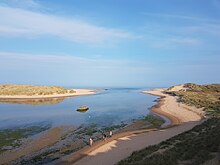
Wikipedia pages can feel a tad lifeless without an image or short video to help illustrate it. We can change that. We can edit!
Just have a look at the images and videos we have added to the University of Edinburgh library page by way of illustration!
- You can add pictures for use on Wiki-pages and beyond on Wikimedia Commons. Your Wikipedia account will work on Commons too – as well as all the other Wiki-projects and different language versions of Wikipedia.
- Openverse.org – You can use image search tools like Openverse.org to find open-licensed images elsewhere on the internet. Just restrict your search for acceptable open-licensed images by filtering to only (1) Public domain, (2) CC-0, (3) CC-BY, or (4) CC-BY-SA images.
- Wikimedia Commons – Once you have found an image with one of these licences then you can upload this image to Wikimedia Commons (a media repository of over 90 million free to use images, sound clips and movie clips) and it can then be inserted into a Wikipedia page.
- Commons:Flickr2Commons is a handy tool to help import both an image and its description information across from Flickr automatically using the unique Flickr image ID or Flickr album ID to import an entire album of images. You just need to login to the tool on Mediawiki using your same Commons login details.
- Commons:Video2commons is another handy tool to help convert video files to acceptable open formats (.ogg and .webm) for Wikimedia Commons and auto import the file to Commons once conversion is complete. You just need to login to the tool on Mediawiki using your same Commons login details.
Why not help document cultural heritage as part of the world's largest photo competition, Wiki Loves Monuments, where thousands of photos of listed buildings and monuments worldwide (interiors and exteriors) are uploaded for the benefit of the global open knowledge community every year
Some ways to keep track of your edits
- You can view all your contributions to Wikipedia by clicking "Contributions" (in the top right of this page).
- The Pageviews tool is a great way of measuring how many people are looking at the page you created/edited. You can even export the data if you'd like it for reports, etc.
After today
[edit]Once you've learned the basics of editing using Wikipedia's Visual Editor, I hope that you'll stay logged in and edit or create more articles. As a first step you may like to check out what What Wikipedia is not along with its 5 guiding principles: The 5 pillars.
- The Wikipedia Adventure Start Page – a fun tutorial introducing new editors to Wikipedia
- Visual Editor user guide
- Questions – a guide on where to ask questions
- The Teahouse new editor help space
- Wikipedia Help pages
- The simplified ruleset – a summary of Wikipedia's most important rules
- Is your topic notable enough for an article?
- Be Bold!
- Don't let grumpy users scare you off.
- Learn from others
- How to write a great article
- A simplified manual of style
- Please sign your messages on talk pages with four tildes (~~~~). This will automatically insert your "signature" (your username and a date stamp). The
 or
or  button, on the tool bar above Wikipedia's text editing window, also does this.
button, on the tool bar above Wikipedia's text editing window, also does this. - If you would like to play around with your new Wiki skills without changing the mainspace, the Sandbox is for you.
- Check out upcoming Wikimedia in Scotland editing events.
- Check out upcoming Wikimedia UK editing events.
Video guides to editing Wikipedia
[edit]- Wikipedia – It's main policies & guidelines
- Navigating Wikipedia's front page
- How to structure an article on Wikipedia: the Featured Article
- Wikipedia editing in 30 mins
- How to edit an existing article the right way
- How easy is Wikipedia's Visual Editor? 5 min walkthrough
- How to edit using with Visual Editor Part 1: Creating an Account
- Editing Wikipedia using Visual Editor: Part 1.1 Adding Headings
- Editing Wikipedia using Visual Editor: Part 1.2 Adding bold & italics
- Editing Wikipedia using Visual Editor: Part 1.3 Adding bullet points
- Editing Wikipedia using Visual Editor: Part 1.4 Adding links
- Editing Wikipedia using Visual Editor: Part 2.1 Adding citations and references
- Editing Wikipedia using Visual Editor: Part 2.2 Further practice with citations (DOI and Pubmed IDs)
- Editing Wikipedia using Visual Editor:Part 2.3 Adding an image
- Editing Wikipedia using Visual Editor: Part 2.4 Adding categories
- Editing Wikipedia using Visual Editor: Part 3 Creating a new article in the Sandbox
- Editing Wikipedia: Communicating with others using the Talk page and Help Desk
- Moving a drafted article into Wikipedia's live space.
- Create visually dynamic timelines in minutes with Histropedia
- Use the 'Find Link' tool to add links BACK to your page from other pages that SHOULD link to your page.





